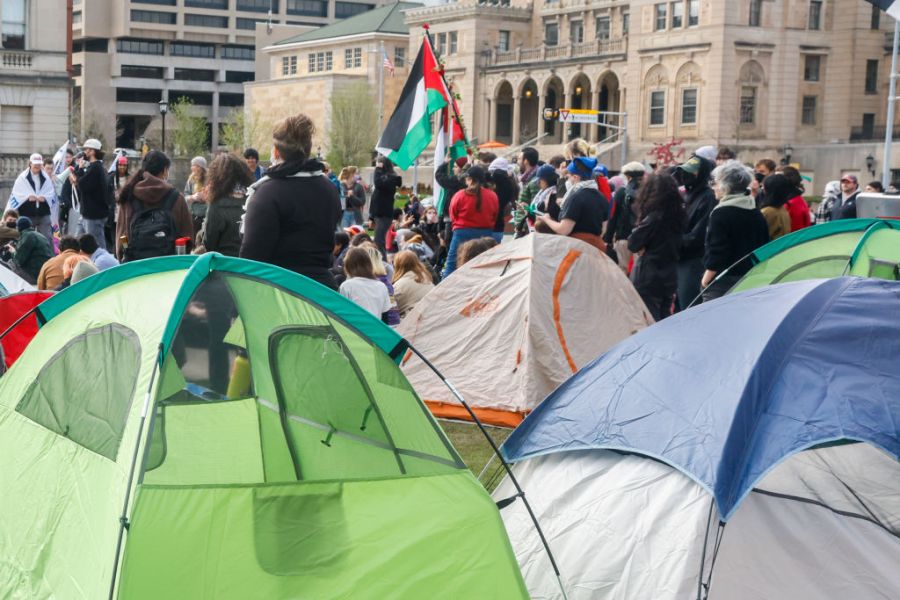
When I entered the Palestine protest encampment on UW-Madison’s campus, I didn’t know what to expect. After the chaos I had read about at other such college encampments, I certainly didn’t expect “pathetic” to stick out as the most descriptive word when I walked away an hour later.
It was the sidewalk chalk in particular, which was of course everywhere. Silent slogans were plastered on every inch of cement, written with a utensil that my three-year-old daughter uses on a driveway.
A doodle of Garfield grinned next to the words “Make lasagna, not war.” Another protester had written “we will not rest until olive Palestine is free,” and the “O” in olive was (you guessed it) an olive. What a win for peace in the Middle East!
The next little oddity was the schedule of the day’s programming, scribbled onto a whiteboard next to the “people’s kitchen,” an ensemble of picnic tents and tables scattered with Pure Leaf Tea and various condiments. Today’s run-of-show featured several teach-ins, two community meetings, “pinkwashing,” and live music in the evening.
With the earliest event was thirty minutes away, probably 100 college students milled about on the lawn. Most had computers out, likely finishing essays (if they still assign those) or cramming for finals (if they still grade those).
An announcer broke the silence and reminded everyone to mask up for each other’s safety. Yes, we were well into 2024, yet most everyone wore masks like they were part of the uniform. Others chatted in camping chair circles. More than anything, it just seemed like another thing to do for college students while prepping for finals, like meeting up at a coffee shop but with a sense of moral superiority.
Madison’s grand encampment wasn’t always this sleepy. The day prior, police had cracked down, arresting 34 protesters for violating rules against camping on university grounds. Four officers were injured in the process; one protester struck a policeman on the head with a skateboard. One of the professors leading the cause is a self-proclaimed “pleasure activist” who frequently posts videos of herself twerking on stage in little more than fishnets. (I’d include links for evidence, but no one deserves that kind of punishment.) I wonder how they’d feel about that in the Gaza Strip.
To draw attention back, a masked woman shouted “mic check” into a bullhorn to signal the start of the “teach-in.” The crowd responded “mic check” and so began the lesson on diaphragmatic breathing. According to this combat-boot wearing protest leader, capitalism has ingrained in us poor breathing habits and posture, and she was here to help us unlearn such internalized oppression.
She encouraged everyone to stand with a relaxed posture and then had all participants take a few collective deep breaths and hiss them out together. There was even a competition to see who could hiss the longest (the winner got to lead chants later). To practice these newly learned skills, she led the group in a few call-and-responses: “From the river to the sea, Palestine will be free,” and “Not another nickel, not another dime, we won’t pay for Israel’s crimes.” Truly cathartic and healing.
The protesters did have concrete demands. They wanted the university to divest from all companies benefiting from the war, disclose all investments, cut ties with Israeli institutions, make a statement in support of an immediate ceasefire, get all police off of campus, and cease land expansion of the university.
But it’s unclear how this sit-in protest accomplishes any of those goals. The chants of a few protesters on the other side of the globe from the conflict feels like the very embodiment of impotence. Even at larger protests, such as Columbia’s, where the number of protesters and the chaos they create places real pressure on administrators, there’s a risk of a backfire.
There is considerable evidence that riots during election years harm Democrats. Race riots after MLK’s assassination helped elect Richard Nixon. The extremism of the 1960s fostered the Reagan revolution. In 2024, the majority of voters supported campuses using police to maintain order, and no majority wants universities to make a statement in support of either Israel or Hamas. Voters would prefer for colleges to teach students and keep out of politics.
Just before the teach-in began, four professors (one of them with purple hair) walked into the encampment toting a “Professors support you” banner to thunderous applause. Even if we take their demands at face value, perhaps these professors, the adults, would better serve their charges by imparting to them the knowledge and skills required to actually craft policy, make compelling arguments, or build lasting institutions. Instead, they joined in the cosplay.
I stopped back at the end of the day, and it was raining. Everyone had matching plastic ponchos, a woman lent me a “people’s umbrella,” and the slogans scribbled on the ground had washed away.
Daniel Buck is a policy associate at the Fordham Institute.














